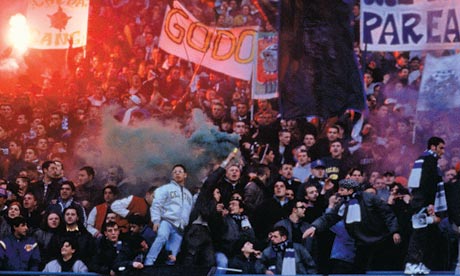
I've always thought that the best way to learn Italian by far, and also get inside the Italian mindset, is just to watch football. If you watch it on television, you'll be amazed by the formality and verbosity of the commentators. They use words such as commissario tecnico (a manager) or verticalizzazione (an incisive through ball). But if you actually stand in a football stadium, you'll get something more earthy. If you listen to the brilliant insults and compliments, you'll begin to learn not just new words but also a zany humour, which does much to explain Italians' attitude towards life. The insults simply sound more refined in Italy. In Britain, the referee's only ever a wanker, poor chap, but in Italy he's cornuto ("horned", the slang for cuckold).
If you prefer to play the game, then join one of the informal matches you'll see in the parks - just shout cè' spazio per un altro? as you're stretching your muscles ("is there space for one more?"). Invariably they'll welcome you. Unless you have a perfect accent, they'll know you're English and call you - without irony - "Beckham" for the duration. During the game your most important words by far will be passa, passa la palla because they love their dribbling. When somone is really being a ball hog, smile and say non fare il veneziano ("don't be a Venetian". The joke being, of course, that Venetians never passed the ball for fear of it ending up in a canal). If someone goes down too easily - and gravitational pull does seem stronger on Italian football pitches - put your wrists by your ears, palms flat to the sky and say non ti ho mica toccato ("I never touched you"). You could accuse them of being a tuffatore or a simulatore (a diver or faker), but that might lead to a diplomatic incident; and, to be honest, the amazing thing about park games in Italy is the gentility and generosity of players you've never seen before.
What you'll realise is that football, like much of Italian life, is all about performance, theatricality and spectacle (spettacolo is, after bello, about the most common word you'll hear). It's about showing off, surprising, dazzling and astounding. It's about evoking superlatives even though you know it's all just a game. That, perhaps, is why two words are centrally important, both to football and everyday life: fantasia ("fantasy") and furbizia ("cunning"). Both involve a creativity so unexpected, so sublime or shocking, that it gives the practitioner an unassailable advantage over the opposition. Even politics can appear a charade, hence the disparaging term of il teatrino for the world of political illusionism.
Perhaps not surprisingly for such a theatrical country, many of the words used in the theatre are used in everyday life. Bis means encore, and is shouted at the end of a play, but it's also used at the dinner table to mean a second helping. The word regia means direction, and when you're reading about some scandal in the papers you'll always be told about the regia occulta, the "hidden direction" behind the scenes. But one of the most common theatrical word you'll hear is the beautifully blunt way they say "break a leg" to an actor: merda! ("shit").
Funnily enough, one of the hardest parts about learning the sporting or cultural vocabulary is relearning English words. They can only be singular, even when, instinctively, you think they should be plural: ho visto alcuni film di Bertolucci means literally: "I've seen some of Bertolucci's film [no "s"]". One also has to relearn Italian words that are familiar but used incorrectly in English: a male ballet dancer is a ballerino, and bravo is only said to a man, brava is used for a woman (brave is the feminine plural and - we're getting there - bravi is the male, or generic, plural).
In the cinema you may talk about a flop, but in the theatre it's only ever a fiasco (which also means a flask).
• Tobias Jones is the author of The Dark Heart of Italy. His novel The Salati Case (Faber) is out now

